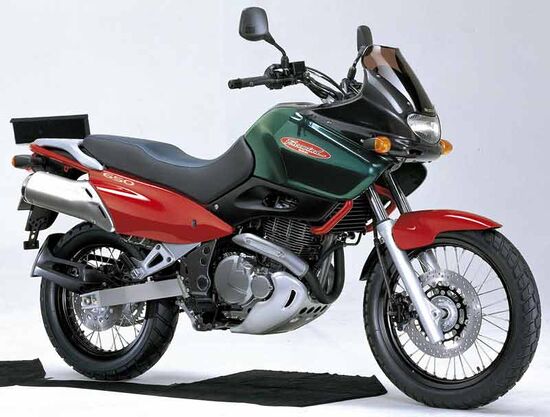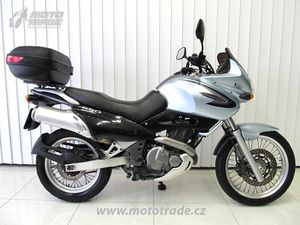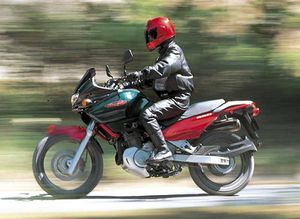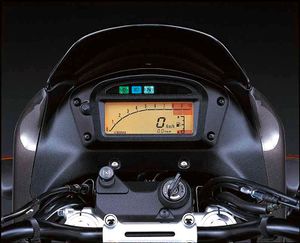Difference between revisions of "Suzuki XF650 Freewind"
m |
m |
||
| (5 intermediate revisions by the same user not shown) | |||
| Line 1: | Line 1: | ||
| − | {{DISPLAYTITLE: | + | {{DISPLAYTITLE: Suzuki XF 650 Freewind}} |
| − | + | __notoc__ | |
| − | + | [[file: RDIA G7G-01.jpg | 550px | center | Suzuki XF650 Freewind (1997-1999)]] | |
| − | + | The Suzuki XF 650 Freewind was first introduced in 1997 as a response to European single-cylinder flagships - the BMW F650 and Aprilia Pegaso 650. | |
| − | + | {{Ads_top}} | |
| − | + | If we compare the Suzuki XF650 Freewind with the same Aprilia Pegaso 650, it turns out that these two motorcycles are very similar in appearance - the shape of the front fairing, the gas tank and plastic, the dimensions of the wheels, single disc brakes - all this is very similar to Aprilia. The tailpipe design and rear mudguard are very similar to those used on the 90s BMW F650. | |
| − | |||
| − | |||
| − | |||
| − | |||
| − | |||
| − | + | Particular attention can be paid to the dashboard, which was completely digital and included a tachometer, speedometer, and a handy fuel gauge. This was not the case on competitors: all the instruments were analog, and the fuel reserve lamp could be found only in the Aprilia Pegaso 650, while the BMW F650 did not even have one. | |
| − | + | The main feature of the Suzuki XF 650 Freewind is the 644cc, 1-cylinder, 4-stroke, air / oil cooled engine. see, delivering 48 hp. power and almost 52 Nm of torque. This motor did not become an independent development of Suzuki, but migrated from the series of off-road motorcycles [[Suzuki_DR650 | Suzuki DR 650]]. The engine is characterized by confident traction from low to medium revs and gives its maximum performance at 5500-7000 rpm. | |
| − | + | Comparing the Suzuki XF 650 Freewind engine with the Rotax engine installed on the main competitors (BMW F650 and Aprilia Pegaso 650), it should be noted that the Freewind 650 air-oil engine is simpler due to the lack of a liquid cooling system, one camshaft (SOHC) and the classic 4 -valve cylinder head (Aprilia Pegaso 650 has 5 valves). At the same time, in terms of power parameters, the Suzuki XF 650 Freewind is only slightly inferior to its European counterparts. | |
| − | ''' | + | '''' The main competitors of the Suzuki XF650 Freewind in the class '''' |
| − | '' | + | '' European models: '' |
* BMW F650 (Funduro, ST) | * BMW F650 (Funduro, ST) | ||
* Aprilia Pegaso 650 | * Aprilia Pegaso 650 | ||
| − | '' | + | '' Japanese models: '' |
| − | * [[Honda_NX650_Dominator|Honda NX 650 Dominator]] | + | * [[Honda_NX650_Dominator | Honda NX 650 Dominator]] |
| − | * [[Kawasaki_KLR650|Kawasaki KLR 650]] | + | * [[Kawasaki_KLR650 | Kawasaki KLR 650]] |
| − | * [[Yamaha_XTZ660_Tenere|Yamaha XTZ 660 Tenere]] | + | * [[Yamaha_XTZ660_Tenere | Yamaha XTZ 660 Tenere]] |
| − | |||
| − | |||
| − | |||
| − | |||
| − | |||
| − | |||
| − | |||
| − | |||
| − | |||
| − | |||
| − | |||
| − | |||
| − | |||
| − | |||
| − | |||
| − | |||
| − | |||
| − | |||
| − | |||
| − | + | == Photos == | |
| − | + | {| border = "0" | |
| − | + | | [[Image: IMG 2677.jpg | 300px | thumb | right | Suzuki XF650 Freewind]] | |
| − | + | | [[Image: Suzuki-xf-650-freewind-2000-4.jpg | 300px | thumb | right | Suzuki XF650 Freewind]] | |
| − | + | | [[Image: Meter-01.jpg | 300px | thumb | right | Suzuki XF650 Freewind]] | |
| − | |||
| − | |||
| − | |||
| − | == | ||
| − | {| border="0" | ||
| − | |[[Image:IMG 2677.jpg|300px|thumb|right|Suzuki XF650 Freewind]] | ||
| − | |[[Image:Suzuki-xf-650-freewind-2000-4.jpg|300px|thumb|right|Suzuki XF650 Freewind]] | ||
| − | |[[Image:Meter-01.jpg|300px|thumb|right|Suzuki XF650 Freewind]] | ||
|- | |- | ||
|} | |} | ||
| − | == | + | {{Ads_feed}} |
| − | + | {{Ads_post}} | |
| − | {| class="wikitable" | + | |
| − | ! scope="row"| | + | == Specifications == |
| − | |Suzuki XF650 Freewind | + | Specifications Suzuki XF 650 Freewind: |
| + | {| class = "wikitable" | ||
| + | ! scope = "row" | Model | ||
| + | | Suzuki XF650 Freewind | ||
|- | |- | ||
| − | ! scope="row"| | + | ! scope = "row" | Motorcycle type |
| − | | | + | | tourist enduro |
|- | |- | ||
| − | ! scope="row"| | + | ! scope = "row" | Release year |
| − | |1997-2001 | + | | 1997-2001 |
|- | |- | ||
| − | ! scope="row"| | + | ! scope = "row" | Frame |
| − | | | + | | steel |
|- | |- | ||
| − | ! scope="row"| | + | ! scope = "row" | Engine type |
| − | |1- | + | | 1-cylinder, 4-stroke |
|- | |- | ||
| − | ! scope="row"| | + | ! scope = "row" | Working volume |
| − | |644 | + | | 644 cc cm. |
|- | |- | ||
| − | ! scope="row"| | + | ! scope = "row" | Bore / stroke |
| − | |100 | + | | 100.0mm x 82.0mm |
|- | |- | ||
| − | ! scope="row"| | + | ! scope = "row" | Compression ratio |
| − | |9 | + | | 9.5: 1 |
|- | |- | ||
| − | ! scope="row"| | + | ! scope = "row" | Cooling |
| − | | | + | | air, with SACS |
|- | |- | ||
| − | ! scope="row"| | + | ! scope = "row" | Number of valves per cylinder |
| − | |SOHC, 4 | + | | SOHC, 4 valves |
|- | |- | ||
| − | ! scope="row"| | + | ! scope = "row" | Fuel supply system |
| − | | | + | | carburetor, 2x Mikuni BSR32 |
|- | |- | ||
| − | ! scope="row"| | + | ! scope = "row" | Ignition type |
| − | |CDI | + | | CDI |
|- | |- | ||
| − | ! scope="row"| | + | ! scope = "row" | Maximum power |
| − | |48 | + | | 48 hp (35 kW) at 7000 rpm |
|- | |- | ||
| − | ! scope="row"| | + | ! scope = "row" | Maximum torque |
| − | |51 | + | | 51 Nm (5.2 kg-m) at 5500 rpm |
|- | |- | ||
| − | ! scope="row"| | + | ! scope = "row" | Gearbox |
| − | |5- | + | | 5-speed |
|- | |- | ||
| − | ! scope="row"| | + | ! scope = "row" | Drive type |
| − | | | + | | chain |
|- | |- | ||
| − | ! scope="row"| | + | ! scope = "row" | Front tire size |
| − | |100/90–19 57H | + | | 100 / 90–19 57H |
|- | |- | ||
| − | ! scope="row"| | + | ! scope = "row" | Rear tire size |
| − | |130/80–17 65H | + | | 130 / 80–17 65H |
|- | |- | ||
| − | ! scope="row"| | + | ! scope = "row" | Front brakes |
| − | |1 | + | | 1 disc, 300 mm, 2-piston caliper |
|- | |- | ||
| − | ! scope="row"| | + | ! scope = "row" | Rear brakes |
| − | |1 | + | | 1 disc, 240 mm, 1-piston caliper |
|- | |- | ||
| − | ! scope="row"| | + | ! scope = "row" | Front suspension |
| − | | | + | | 43mm telescopic fork, 170mm travel (140mm low seat) |
|- | |- | ||
| − | ! scope="row"| | + | ! scope = "row" | Rear suspension |
| − | | | + | | linkage with monoshock (adjustable preload and rebound damping), stroke - 167 mm (132 mm - with a low seat) |
|- | |- | ||
| − | ! scope="row"| | + | ! scope = "row" | Fuel tank capacity |
| − | |18 | + | | 18.5 l (including reserve - 4.5 l) |
|- | |- | ||
| − | ! scope="row"| | + | ! scope = "row" | Length |
| − | |2205 | + | | 2205 mm |
| − | + | 2190mm - Low Seat | |
|- | |- | ||
| − | ! scope="row"| | + | ! scope = "row" | Width |
| − | |865 | + | | 865 mm |
|- | |- | ||
| − | ! scope="row"| | + | ! scope = "row" | Height |
| − | |1230 | + | | 1230 mm |
| − | + | 1200mm - Low Seat | |
|- | |- | ||
| − | ! scope="row"| | + | ! scope = "row" | Wheelbase |
| − | |1465 | + | | 1465 mm |
| − | + | 1455mm - Low Seat | |
|- | |- | ||
| − | ! scope="row"| | + | ! scope = "row" | Saddle height |
| − | |830 | + | | 830 mm |
| − | + | 800mm - Low Seat | |
|- | |- | ||
| − | ! scope="row"| | + | ! scope = "row" | Maximum speed |
| − | |161 | + | | 161 km / h |
|- | |- | ||
| − | ! scope="row"| | + | ! scope = "row" | Acceleration to 100 km / h (0-100) |
| − | |4 | + | | 4.9 sec |
|- | |- | ||
| − | ! scope="row"| | + | ! scope = "row" | Motorcycle weight (dry) |
| − | |162 | + | | 162 kg |
|} | |} | ||
| − | == | + | == Documentation == |
| − | + | [[Category:Motorcycles]] | |
| − | + | * [[Suzuki_XF650_Freewind:_manuals|Suzuki XF650 Freewind]] | |
| − | |||
| − | |||
| − | |||
| − | |||
| − | |||
| − | |||
| − | |||
| − | |||
| − | |||
| − | |||
| − | |||
| − | |||
| − | |||
| − | |||
| − | |||
| − | |||
| − | |||
| − | |||
| − | |||
| − | |||
| − | |||
| − | |||
| − | |||
| − | |||
| − | |||
| − | |||
| − | |||
| − | |||
| − | |||
| − | |||
| − | |||
| − | |||
| − | |||
| − | |||
| − | |||
| − | |||
| − | * [[Suzuki_XF650_Freewind: | ||
| − | == | + | == == |
| − | + | {{Ads_recomended}} | |
Latest revision as of 18:55, 14 August 2021
The Suzuki XF 650 Freewind was first introduced in 1997 as a response to European single-cylinder flagships - the BMW F650 and Aprilia Pegaso 650.
If we compare the Suzuki XF650 Freewind with the same Aprilia Pegaso 650, it turns out that these two motorcycles are very similar in appearance - the shape of the front fairing, the gas tank and plastic, the dimensions of the wheels, single disc brakes - all this is very similar to Aprilia. The tailpipe design and rear mudguard are very similar to those used on the 90s BMW F650.
Particular attention can be paid to the dashboard, which was completely digital and included a tachometer, speedometer, and a handy fuel gauge. This was not the case on competitors: all the instruments were analog, and the fuel reserve lamp could be found only in the Aprilia Pegaso 650, while the BMW F650 did not even have one.
The main feature of the Suzuki XF 650 Freewind is the 644cc, 1-cylinder, 4-stroke, air / oil cooled engine. see, delivering 48 hp. power and almost 52 Nm of torque. This motor did not become an independent development of Suzuki, but migrated from the series of off-road motorcycles Suzuki DR 650. The engine is characterized by confident traction from low to medium revs and gives its maximum performance at 5500-7000 rpm.
Comparing the Suzuki XF 650 Freewind engine with the Rotax engine installed on the main competitors (BMW F650 and Aprilia Pegaso 650), it should be noted that the Freewind 650 air-oil engine is simpler due to the lack of a liquid cooling system, one camshaft (SOHC) and the classic 4 -valve cylinder head (Aprilia Pegaso 650 has 5 valves). At the same time, in terms of power parameters, the Suzuki XF 650 Freewind is only slightly inferior to its European counterparts.
' The main competitors of the Suzuki XF650 Freewind in the class '
European models:
- BMW F650 (Funduro, ST)
- Aprilia Pegaso 650
Japanese models:
Photos
Specifications
Specifications Suzuki XF 650 Freewind:
| Model | Suzuki XF650 Freewind |
|---|---|
| Motorcycle type | tourist enduro |
| Release year | 1997-2001 |
| Frame | steel |
| Engine type | 1-cylinder, 4-stroke |
| Working volume | 644 cc cm. |
| Bore / stroke | 100.0mm x 82.0mm |
| Compression ratio | 9.5: 1 |
| Cooling | air, with SACS |
| Number of valves per cylinder | SOHC, 4 valves |
| Fuel supply system | carburetor, 2x Mikuni BSR32 |
| Ignition type | CDI |
| Maximum power | 48 hp (35 kW) at 7000 rpm |
| Maximum torque | 51 Nm (5.2 kg-m) at 5500 rpm |
| Gearbox | 5-speed |
| Drive type | chain |
| Front tire size | 100 / 90–19 57H |
| Rear tire size | 130 / 80–17 65H |
| Front brakes | 1 disc, 300 mm, 2-piston caliper |
| Rear brakes | 1 disc, 240 mm, 1-piston caliper |
| Front suspension | 43mm telescopic fork, 170mm travel (140mm low seat) |
| Rear suspension | linkage with monoshock (adjustable preload and rebound damping), stroke - 167 mm (132 mm - with a low seat) |
| Fuel tank capacity | 18.5 l (including reserve - 4.5 l) |
| Length | 2205 mm
2190mm - Low Seat |
| Width | 865 mm |
| Height | 1230 mm
1200mm - Low Seat |
| Wheelbase | 1465 mm
1455mm - Low Seat |
| Saddle height | 830 mm
800mm - Low Seat |
| Maximum speed | 161 km / h |
| Acceleration to 100 km / h (0-100) | 4.9 sec |
| Motorcycle weight (dry) | 162 kg |
Documentation



